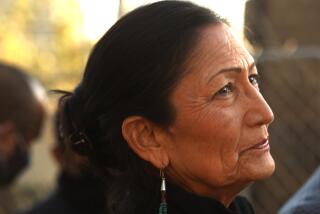Aleuts Ask Panel for Say in Adoption : Courts: Alaskan Indians want the child to live in a tribal village, over the objections of the unwed Cypress mother.
- Share via
SANTA ANA — Lawyers for an Aleut Indian tribe asked an appeals court Wednesday to allow the tribe a say in who should adopt a 21-month-old child born to an unwed Cypress mother.
The mother, 20-year-old Jodi Argleben, wants her daughter, Rebecca, to be adopted by a Vancouver, Canada, couple. The Aleuts want the baby to be placed with an Indian family in Argleben’s native Akhiok Village on Kodiak Island in Alaska.
After lengthy questioning by a three-judge panel of the 4th District Court of Appeal, attorneys for both sides said the court appeared to be prepared to recognize that the tribe has a legal right to intervene in the private, voluntary adoption proceeding.
But the attorneys said they expected the appeals court to send the case back to a lower court for a ruling on who should finally raise the child.
Meanwhile, the attorney appointed to represent the baby urged the court to decide the case swiftly.
Rebecca, who will be 2 in June, has been the object of legal wrangling since her birth, with custody battles being fought simultaneously in Orange County and the Canadian province of British Columbia, where she has been with the Vancouver couple for more than a year.
“It appears from the history of these (Indian child adoption) cases that the appeals will be endless, and that is very much to the detriment to the child,” said Sylvia L. Paoli, Rebecca’s attorney.
“Let the tribe intervene, let them be heard, let the judge make a decision with the evidence before him and let the child go on with her life,” Paoli asked the court.
Argleben and her mother, Judith Argleben, who held hands during much of the proceedings, said they did not understand why the tribe continued to press its claim to Rebecca, since Jodi Argleben has vowed to raise the child herself rather than see her returned to Akhiok.
“I won’t let the tribe have the baby,” she said.
“There’s no way that it can be in a child’s best interest to be raised in Akhiok,” said her mother.
The tribe’s claim to the child is based on the 1978 Indian Child Welfare Act, which was passed by Congress in response to the alarming number of American Indian children being taken from their reservations and placed in non-Indian homes.
At the time, up to one-third of all Indian children had been separated from their families and placed in foster homes, institutions or adoptive homes--nearly eight times the rate for non-Indian children.
The federal law explicitly grants tribes the right to intervene in all child custody proceedings, argued the tribe’s lawyer, Jack F. Trope. The law presumes it to be in the child’s best interests to be placed in an Indian home, unless good cause can be shown to the contrary, Trope said.
Last year, the U.S. Supreme Court bolstered that argument by ruling that Mississippi Choctaw Indians had the right to intervene against Indian parents living on a reservation who wanted their newborn twins adopted by a non-Indian family, Trope argued.
The justices expressed concern that the Vancouver couple, who have asked that their identity not be revealed, were not a party to the California custody case and that any judgment in the California case might not be enforceable in Canada.
Judith Argleben said the adoptive father is a public figure in Canada and did not want the publicity that would follow his entry into the California proceedings.
Jodi Argleben’s lawyer, Christian R. Van Deusen, and attorney Harold La Flamme, who represented Rebecca in the lower court proceedings, both predicted that the Vancouver couple will be able to show that it is in the child’s best interest to remain with them, especially since more than a year has passed.
“My opinion . . . is that it would probably be very traumatic for her to be removed,” La Flamme said.
Jodi Argleben and her sister were born on Kodiak but were taken away from their parents when they were toddlers and adopted by the Arglebens. Jodi Argleben has said she is half Aleut and half Russian, but tribal leaders say they believe she is a full-blooded Indian. Rebecca’s father is of Scandinavian ancestry.
Trope argued that while Jodi Argleben may have been raised in an environment that caused her to be alienated from her heritage, there is no reason why Rebecca should also be estranged.
Trope said many American Indian children who are adopted outside their tribes experience serious adjustment and identity problems.
More to Read
Sign up for Essential California
The most important California stories and recommendations in your inbox every morning.
You may occasionally receive promotional content from the Los Angeles Times.










